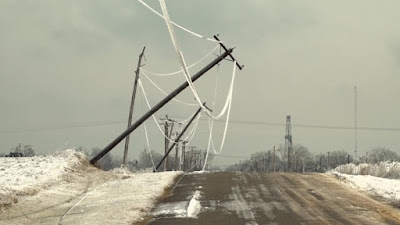 |
| Hurricane Zeta as seen from NOAA satellite early Wednesday morning. Zeta is approaching the central Gulf Coast, expected to make landfall in southeastern Louisiana. (NOAA/NWS) |
Wild weather continues across portions of North America, with a frigid push of Arctic air all the way down to New Mexico and Texas. Meanwhile here in southern Quebec, the first snowfall of season occurred on Monday, with several centimetres falling north of Montreal in the Laurentians. In the city, only a few flurries were reported on Monday, and again early Wednesday morning. Temperatures are much colder than last week, and should remain that way into the Halloween weekend. The weather will be unsettled, with a continued chance of showers or flurries though Friday. High pressure should arrive in time for a dry but cool Halloween.
Across western Canada, the early season cold snap is expected to ease as much milder Pacific air pours into the region late this week. Calgary will see temperatures rise into the upper teens after being as cold as -18C (0F) this week.
While we continue to have fairly mundane weather here in southern Quebec, an early season winter storm dumped 15 to 60cm of snow on portions of the US plains from North Dakota southward into Texas. In addition to the heavy snow, a swath of freezing rain produced an epic ice storm over western Oklahoma and northwest Texas. Over 36 hours of freezing rain caused ice accretions greater than 25mm. The freezing rain was accompanied by thunder and lightning at times. The weight of the ice brought down trees and power lines cutting power to over 300,000 customers in Oklahoma alone.. The wind, snow and ice continue on Wednesday, with widespread warnings in effect. Further west, blizzard conditions are occurring in eastern New Mexico.
In Colorado, the snow provided a little relief to what has been an historic wildfire season. Over 600,000 acres have burned in two separate fires alone, both have now spread into Rocky Mountain National Park. The Cameron Peak Fire, previously the largest fire in the states history, is now 64% contained. The East Troublesome Fire, the second largest in Colorado history is at 20% contained.
 |
| Snow blankets the Cameron Peak Fire in Colorado. (US Forest Service) |
Finally, the record-breaking Atlantic hurricane season shows no sign of ending. Hurricane Zeta, located 380 kilometres southwest of New Orleans Wednesday morning with 150km/h winds, is expected to reach the northern Gulf Coast later today. Forecasters expect Zeta to strengthen to a Category 2 storm before landfall near the mouth of the Mississippi River. The storm will become the 5th tropical system to impact Louisiana this year. Some evacuations have been ordered along the coastlines, including Mississippi and Alabama. Zeta is forecast to move rapidly northeast across the Tennessee and Ohio Valley's and off the Middle Atlantic coast by early Friday. Heavy rains, powerful winds and a large storm surge are expected along the Gulf Coast. Heavy rain and flash flooding is expected inland across the southern Appalachians. Zeta may even bring wet snow to interior southern New England by Friday morning and perhaps portions of Atlantic Canada by the end of the work week.








